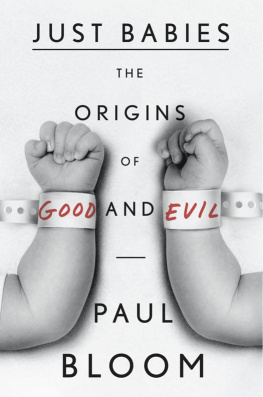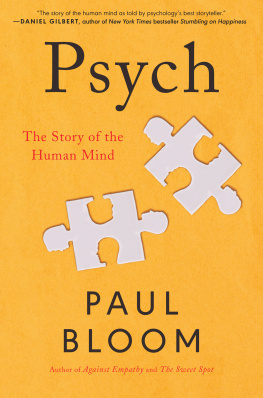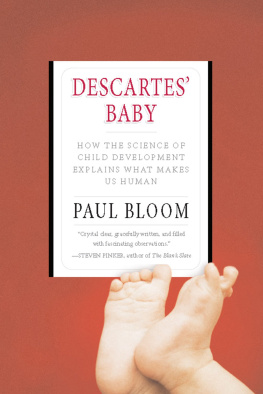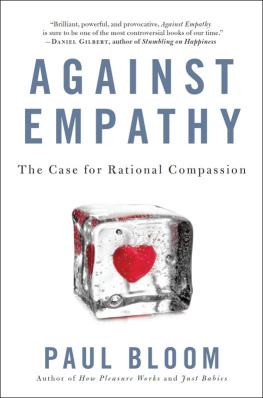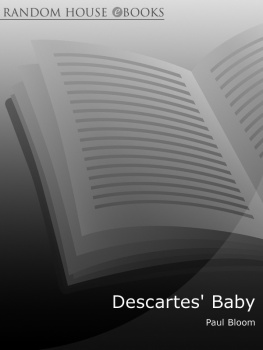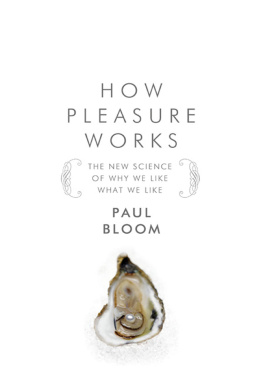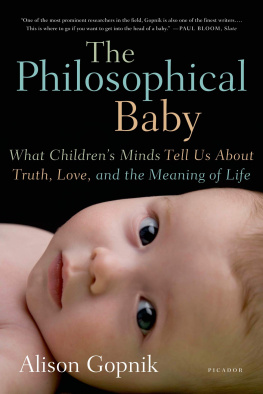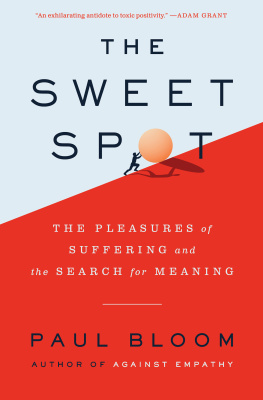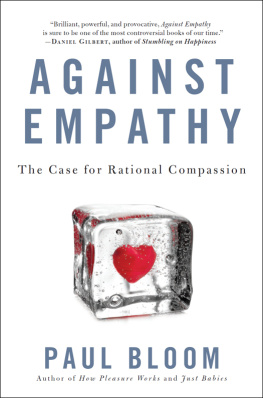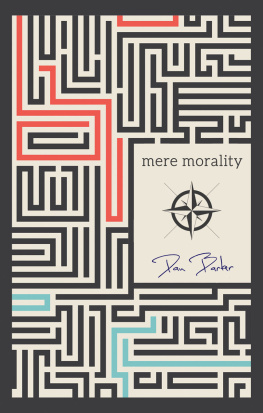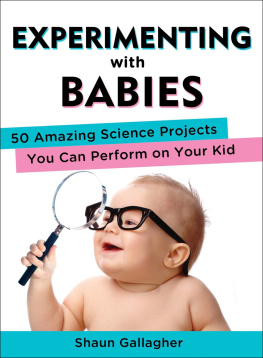M ORE A DVANCE P RAISE FOR
JUST BABIES
A wonderful, in-depth look at how our morality develops from infancy onward, making the strong case for the subtle interplay of genes and environment in the way we turn out A must for social science enthusiasts and parents.
D AN A RIELY , James B. Duke Professor of
Psychology and Behavioral Economics, Duke
University; author of Predictably Irrational
Paul Blooms engaging explorations of the moral preferences of infants set the stage for a book that isnt really about just babies because it goes deeply into the nature of morality itself, for all of us. This is a book for everyone who wants to know more about the kind of moral beings we are.
P ETER S INGER , Ira W. DeCamp Professor of Bioethics,
Princeton University; author of The Life You Can Save
Paul Bloom has such an interesting mind, and its a rare treat to follow as he tracks the origins of human morality. With clarity and wit, Bloom shows that babies have an incredible amount to teach usand in these masterful pages, the lessons are full of surprise and delight.
E MILY B AZELON , author of Sticks and Stones
The Origins of Good and Evil is an ambitious subtitle, but this book earns it. Paul Bloom combines graceful, witty writing with intellectual rigor to produce a compelling account of how and why people are so wonderful and so horrible This book, by fostering self-reflection, is itself a tool of enlightenment, and can help humanity take another step toward the good.
R OBERT W RIGHT , author of The Moral Animal
Just Babies is exactly the combination of penetrating insight, cutting-edge science, and elegant prose that millions of readers have come to expect from one of psychologys best writers and sharpest minds.
D ANIEL G ILBERT , Edgar Pierce Professor of Psychology,
Harvard University; author of Stumbling on Happiness
Paul Bloom is a scientist who knows how to tell a fascinating and charming story. As a new parent, I found Just Babies not only full of insights into my sons developing moral sense but also a great pleasure to read.
J OSHUA F OER , author of Moonwalking with Einstein
Just Babies is a vital contribution to the scientific study of morality that fills in a major gap in our understanding of human nature, and as a bonus its a riveting read!
M ICHAEL S HERMER , publisher of Skeptic
magazine; author of The Science of Good and Evil
Paul Bloom is one of the best psychologist-writers today. In Just Babies he combines hard data with charming anecdote and incisive analysis to explore one of the most profound questions thats ever confronted mankind: how we become moral beings. He makes an erudite and impassioned case for the primacy of deliberation and reason in our livesa truth given short shrift in pop psychology.
S ALLY S ATEL , M.D. , coauthor of Brainwashed
A LSO BY P AUL B LOOM
How Children Learn the Meanings of Words
Descartes Baby
How Pleasure Works
E DITED OR C OEDITED BY P AUL B LOOM
Language Acquisition: Core Readings
Language and Space
Language, Logic, and Concepts

Copyright 2013 by Paul Bloom
All rights reserved.
Published in the United States by Crown Publishers,
an imprint of the Crown Publishing Group,
a division of Random House LLC,
a Penguin Random House Company, New York.
www.crownpublishing.com
CROWN and the Crown colophon are registered
trademarks of Random House LLC.
Library of Congress Cataloging-in-Publication Data
Bloom, Paul, 1963
Just babies : the origins of good and evil /
Paul Bloom.
pages cm
1. EthicsPsychological aspects. 2. Good and evil.
3. Values. 4. Child development. I. Title.
BJ45.B56 2013
155.41825dc23 2013012697
ISBN: 978-0-307-88684-2
eBook ISBN: 978-0-307-88686-6
Jacket design by Christopher Brand
Jacket photography by Chris Frazer Smith (wristband);
Master file/royalty free (arms)
v3.1
Dedicated to Elaine Reiser and Murray Reiser,
for their love and support
Man was destined for society. His morality, therefore, was to be formed to this object. He was endowed with a sense of right and wrong merely relative to this. This sense is as much a part of his nature, as the sense of hearing, seeing, feeling; it is the true foundation of morality. The moral sense, or conscience, is as much a part of man as his leg or arm. It is given to all human beings in a stronger or weaker degree, as force of members is given them in a greater or less degree. It may be strengthened by exercise, as may any particular limb of the body.T HOMAS J EFFERSON , 1787
C ONTENTS
P REFACE
In 2005, a writer living in Dallas heard that an acquaintance of hers was suffering from kidney disease. Without a transplant, Sally Satel would soon be on dialysis, tethered to a machine to filter her blood for three days a week. After doing some research and talking with her husband, Virginia Postrel flew to Washington, D.C., and had her right kidney transplanted into Sallys body. Kidney transplants typically occur between family members, but Virginia and Sally were not even close friends. Still, Virginia said that she felt empathy for Sallys situation and liked the idea of being able to help in a straightforward way. Others go even further: they log on to sites such as matchingdonors.com and arrange to donate their kidneys and other organs to complete strangers.
Some people see this sort of altruism as evidence of a moral code implanted by God. Among them are prominent scientists like Francis Collins, the head of the National Institutes of Health, who argues that such acts of selflessness prove that our moral judgments and moral actions cannot be fully explained by the forces of biological evolution. They demand a theological explanation.
Along with this transcendent kindness, though, there is appalling cruelty. I read in the newspaper this morning about a man whose girlfriend broke off their relationship; he later stalked her and threw acid at her face. I remember, as a child, first hearing about the Holocaust, of gas chambers and sadistic doctors and children being turned into soap and lampshades. If our wondrous kindness is evidence for God, is our capacity for great evil proof of the Devil?
Then there are the more mundane acts of kindness and cruelty. For myself, its the bad things that I remember the most. Some of the choices I have made in the past still make me squirm. (If this is not true of you, then you are a much better person than I amor much worse.) Some were honest mistakes based on what I thought was right at the time. But in other instances, I knew the right thing to do but chose to do something else. As Yoda might have put it, Strong is the Power of the Dark Side. Still, while I admit that I retain both of my kidneys, I have sacrificed to help others and taken risks for causes that I felt were right. In all of these regards, I am perfectly typical.
Morality fascinates us. The stories we enjoy the most, whether fictional (as in novels, television shows, and movies) or real (as in journalism and historical accounts), are tales of good and evil. We want the good guys to be rewardedand we really want to see the bad guys suffer.
Our appetite for punishment can go to extremes. In England a few years ago, a cat was found trapped in a garbage bin after having been lost for many hours. The owner discovered what had happened by viewing footage from a security camera overlooking the street. A middle-aged woman had picked up the cat, looked around, opened up the bin, and tossed it in. Then she had closed up the bin and walked away. The owner posted this video on Facebook, and the woman, Mary Bale, was quickly identified. Now, its not hard to see why Bales action would be upsetting to the cat owner (and to the cat, for that matter), but thousands of people were powerfully affected by what they saw. They wanted her blood. Someone created a Facebook page called Death to Mary Bale, and she had to be put under police protection. Indeed, people have been murdered by mobs that believe them to be guilty of immoral actsincluding acts that others believe to be morally acceptable, such as having sex without being married.
Next page
